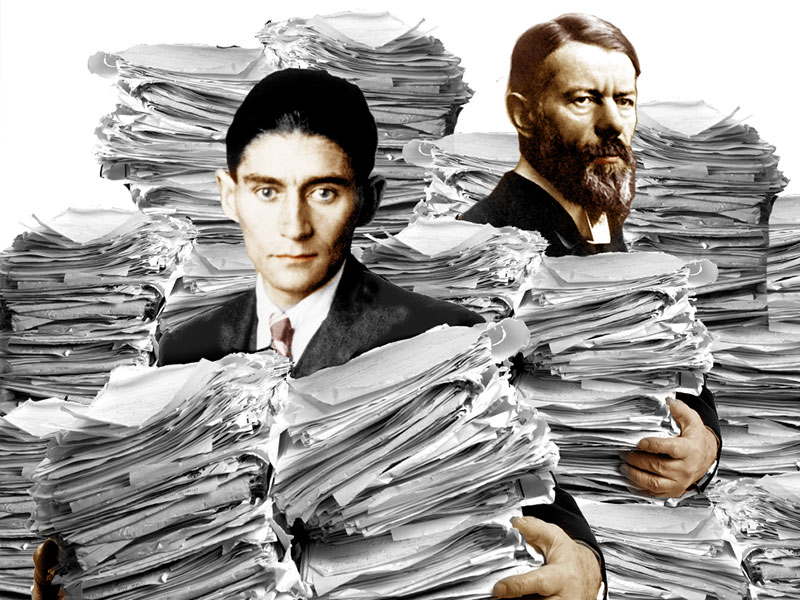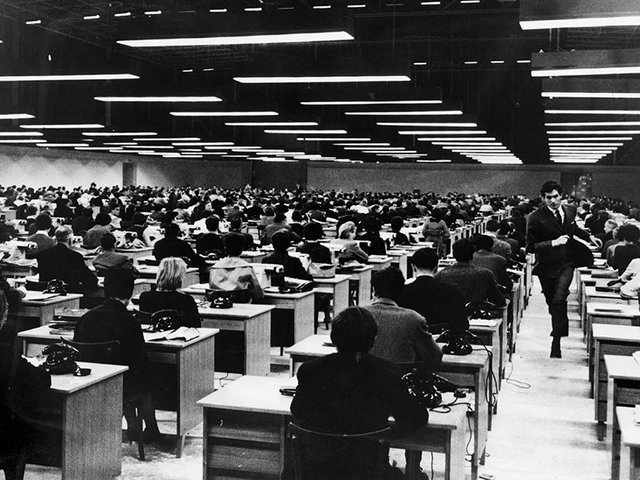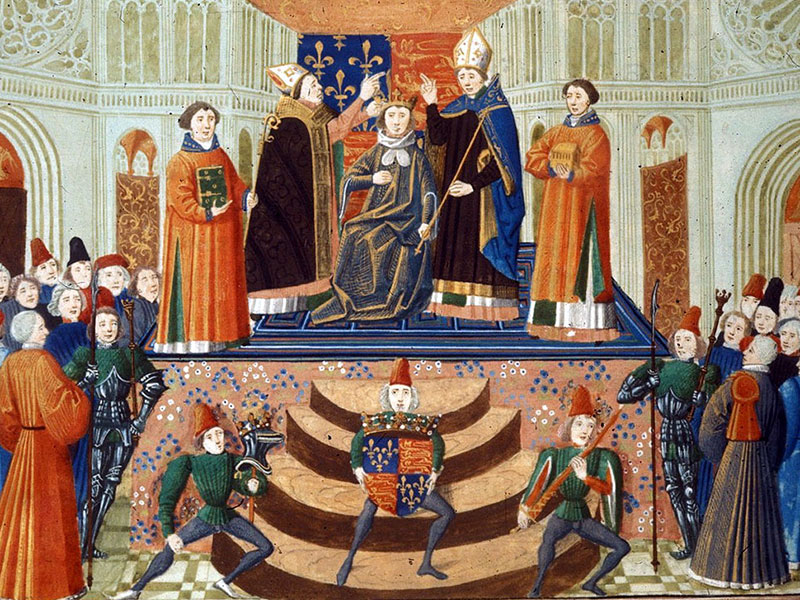Bureaucracy in the Workplace: Emergence and Moral Implications
We all have to deal with it in one way or another, but how much do we know about bureaucracy and the way it affects our values and beliefs? What pushed me down this rabbit hole was a book recommended by one of my heroes, Aaron Swartz, who committed suicide in 2013 after being charged with two counts of wire fraud and eleven violations of the Computer Fraud and Abuse Act for systematically downloading articles from JSTOR. Aaron is known for developing the web feed format RSS, the organization Creative Commons, the social news site Reddit, and the online group Demand Progress. The book is called Moral Mazes: The World of Corporate Managers.
I know, the “b” word is a drag, if not a complete mystery, for most of us. It’s a word few attempt to spell, let alone re-imagine. Yet aside from a number of outliers, most companies today continue to embrace a bureaucratic structure of operation. While it’s hard to dispute the positive contributions of bureaucracy, its historical emergence in the workplace and the shape it took in the US reveal a more nuanced understanding of how top-down, hierarchical systems shape the moral rules of a company. This has incredible implications for Millennials, most of whom place values and morals as the most important factor in their decision-making at work.

Author Franz Kafka and sociologist and founder of bureaucracy research Max Weber. Credit: Harald Groven
On one hand, bureaucracies are efficient administrative systems capable of dealing with complex problems through rational calculation. On the other hand, there’s the Kafkaesque view of bureaucracy as a dehumanizing system of power, privilege, and domination. Even Max Weber, the pioneering sociologist who coined the term, acknowledged the loss of individuality and autonomy when one becomes a part of the bureaucratic machine. Weber described bureaucratization of social order as “the polar night of icy darkness.”
While it’s true that certain business operations require a bureaucratic model to be efficient, hierarchical structuring and governance of bureaucracies can be detrimental to employee productivity and innovation. According to Tony Hsieh, internet entrepreneur and CEO of Zappos, one of the world’s largest online shoe stores:
"Research shows that every time the size of a city doubles, innovation or productivity per resident increases by 15 percent. But when companies get bigger, innovation or productivity per employee generally goes down. So we’re trying to figure out how to structure Zappos more like a city, and less like a bureaucratic corporation."
This is the main rationale for Zappos to implement Holocracy — a system that “removes power from a management hierarchy and distributes it across clear roles, which can then be executed autonomously, without a micromanaging boss.” Zappos is joined by a diverse number of notable companies that consider hierarchies to be more or less overrated.
The nature of Zappos’ structural transformation and its effect on employees has been well documented, with some claiming that employees prefer the predictability, practicality, and comfort of hierarchical structures. According to Jeffrey Pfeffer, professor of organizational behavior at Stanford, the beliefs and behaviors connected to “hundreds of years of hierarchical power structures” are a part of our “collective, corporate DNA.” Pfeffer suggests that the desire to flatten organizations is partly due to wishful thinking to distribute power and influence, and also due to the impact of new technologies in helping us view hierarchies as disappearing or irrelevant. Even Hsieh himself admits that self-management and self-organization are not for everyone.
However, the movement to distribute authority, define and update roles around work (instead of people), continuously reexamine organizational structure with rapid iterations, and instill transparency appears to be more than wishful thinking as an increasing number of company leaders are exploring new ways of running their organizations. And while “flattening” or “delayering” of work structures is often connected to increasing efficiency and savings costs, it is worth considering the moral implications of working in traditional power structures. After all, the decision to distribute authority or rely on a hierarchy is about the day-to-day morality (the distinction between right and wrong or good and bad behavior) in a workplace. How can we examine the effects of bureaucratic morality in an organization?
The book Moral Mazes: The World of Corporate Managers, written by Robert Jackall, outlines an interpretative sociological study on the moral rules fashioned within the personal and structural constraints of four companies. Jackall treats morality “as empirical, objective realities to be investigated” and analyzes the particular kind of ethics modern bureaucracies instill in managers, whom he defines as the “principle carriers of the bureaucratic ethic.”
Let’s say you work in HR and the President of the company wants you to hire “under the table” a member of his offspring for triple the amount he/she should normally get for that position. Obviously, your morals dictate that this is wrong. However, as carrier of the bureaucratic ethic of this particular company, you have to do what you are told. This example illustrates how most people are (or rather, have to be) carriers of the highly specific, and often unarticulated, bureaucratic ethic of their workplace in order to remain employed.
Here’s the twist — according to Jackall, the kind of bureaucracy embraced in the US differs greatly from the classical notion articulated by Max Weber. In fact, the above scenario would’ve never been able to take place if said company operated according to traditional-type bureaucracy. This begs the question — why are such cases so prevalent? In order to understand the bureaucratic ethic in the US and how it affects employees, we first need to analyze the emergence and historical significance of bureaucracy, starting with the Protestant work ethic.
Protestant Work Ethic and The Bureaucratization of Work
The phrase “Protestant work ethic” was coined in 1904–05 by Max Weber — a renowned sociologist, philosopher, and political economist. The ethic emphasizes that self-reliance, hard work, and thriftiness are a sign of one’s salvation in the Protestant faith. This rational pursuit of a vocation was significant in the lives of self-made farmers, merchants, and entrepreneurs whose highest form of moral obligation, their “calling,” was to serve God not just by prayer, but by ceaseless work which proved a person before others.
The peculiar combination of wealth accumulation without pursuit of “worldly” pleasures is what Weber defined as the “spirit of capitalism.” The Protestant work ethic is often credited with laying the economic and moral foundations of modern capitalism and defining the societies of Northern Europe.

By the turn of the 20th century, the core of the Protestant work ethic — its religious underpinnings, imperatives for saving and investment, and the morality that came from ascetic devotion — were undermined by the complete transformation of work.
Capital accumulated during the Second Industrial Revolution (1860–1914) gave rise to a “new rich” social class. Later on, major improvements in the standard of living and the emergence of a middle class shaped what we now call the consumer society. Measures of prestige and social status defined by conspicuous consumerism (spending money to buy goods and services for their own sake and for public display of economic power), replaced the practical spending habits practiced by carriers of the old ethic.
Technological breakthroughs in transportation, such as the invention of the railroad, gave rise to mass production which required administrative coordination and centralization. These processes caused the emergence of internal administrative hierarchies and the ascendance of a new middle class of salaried employees who replaced the traditional carriers of the Protestant ethic.
Whereas the old ethic placed importance on self-made entrepreneurs driven by a distinctive moral outlook, self-discipline, and frugality the Bureaucratic ethic made dependence on “big organization” the chief common characteristic for those employed. Success no longer depended on one’s own efforts in the eyes of an unknowable God, but on the demands of one’s superiors and the market.
Although the Protestant ethic is still practiced by some societies in its traditional religious context, the moral and social character it embodied were profoundly affected by the bureaucratization of work . In the US, the Protestant ethic became secularized into what Jackall calls the “success ethic” and rugged individualism. “In the bargain,” he writes, “bureaucratization has shredded and reknit whole communities by making individual life chances almost wholly dependent on bureaucratic career lines.”
Hybrid Bureaucracy and the American Character
Max Weber defined bureaucracy as “the exercise of control on the basis of knowledge,” characterized by legalistic objectivity, rational principles, adherence to standardized procedures, and separation of offices from persons. To some degree, we’ve all experienced aspects of this kind of bureaucracy. Most traditional power structures contain parts of those “ideal” bureaucratic features. However, in the same way bureaucracy has shaped our way of living, various cultures have hybridized the traditional form of bureaucracy to fit their needs.
Historically, the frontier experience required Americans to come up with individualistic solutions to their problems, even if they required deviation from the law. In addition, the millions of immigrants who came to the US (who were, generally, from peasant origins) were not attracted to the formality of the traditional bureaucratic model. Therefore, traits central to the American experience such as personal loyalty, favoritism, informality, and non-legality were fused into the pure form of bureaucracy. According to Jackall, the resulting “hybrid bureaucracy” has some resemblance to what is called patrimonial bureaucracy, which is the organizational form of the courts of kings and princes:
"There, personal loyalty was the norm, not loyalty to an office. In a patrimonial bureaucracy, one survives and flourishes by currying favor with powerful officials up the line who stand close to the ruler. It is a system marked by patronage and by intrigues and conspiracies among various factions to gain the favor of the ruler and the perquisites that accompany his good grace."

The creation of hybrid bureaucracy in corporate environments and the ethic it produces in managers are the main topics of inquiry in Moral Mazes. According to Jackall, because success and failure at work no longer depend on one’s own efforts, but on internal rules which every bureaucracy creates for itself, internal and external standards of morality become eroded and employees have to turn to each other for moral cues for behavior.
According to this theory, in a bureaucratic world, morality is specific for significant people up the chain of command. Therefore, employees have to bracket their own moral values and adjust them according to different situations. How do employees guide their way through this world? It’s a lot like going through a maze. Robert Jackall sums up his findings in a Harvard Business Review article:
"As it happens, the guidance they [men and women in bureaucracies] receive from each other is profoundly ambiguous because what matters in the bureaucratic world is not what a person is but how closely his many personae mesh with the organizational ideal; not his willingness to stand by his actions but his agility in avoiding blame; not what he believes or says but how well he has mastered the ideologies that serve his corporation; not what he stands for but whom he stands with in the labyrinths of his organization. In short, bureaucracy structures for managers an intricate series of moral mazes."
Yet some suggest that the traditional power structure, with all of its hybridity and inherent dissonance, weeds out the strong from the weak. Professor Jeffrey Pfeffer finds that hierarchical power structures are linked to “survival advantages.” According to him, you can’t play “the game” by different rules. It is clear that the command-and-control approach of traditional power structures appeals to a lot of company leaders.
However, that doesn’t change the fact that what is considered bureaucracy in the US is far from the “ideal type” characterized by Weber; it also doesn’t take away from efforts of companies such as Zappos, Buffer, Valve, Autommatic, Git Hub, and W.L. Gore to distribute decision-making authority within their organizations.

Implications
We live in a world where we can track the making of our pizza ten blocks away, but we generally have no idea what constitutes success at our workplace. Could this be part of the reason why, according to a Deloitte report, two thirds of Millennials express desire to leave their organization by 2020? In the same report, Millennials list “personal values and morals” as the number one factor influencing their decision making. On a global scale, 56% of Millennials have “ruled out ever working for a particular organization because of its values or standard of conduct.”
There are many reasons why employees choose to pack up, or even worse — remain disgruntled and disengaged. Many of those reasons are connected to the moral terrain of a workplace, which for most companies is shaped by a bureaucratic organizational structure. While the “flattening” and “delayering” of organizations is often associated with reducing costs or increasing productivity, the effects of bureaucracy (in its many forms) on employees’ morality, motivation, and engagement cannot be underestimated, especially when we take into account the Millennials’ connection to morals and values.
Ethics and morality at the workplace are usually addressed through cultural clichés and conventional moral codes, instead of objective realities specific to every organization. If we want to address these moral dilemmas proactively, we have to analyze workplaces as organizational systems, rather than dealing with their symptoms. According to our take on bureaucracy, we could either sustain our faith in the “tried and true” power structure, or try something different.
Damn, Zhivko! Killed it to death. You should use better tags though so people can see this better. The tags on the right of the main page are the most commonly used ones which of course have the most visibility. Try making another post and using more appropriate and viewed tags and you will get MUCH better action.
Luv u.
Dang! Great tips brother -- I will make sure to do that!! I wish I could write stuff like this for living - most of it was written while "working," which has its charm, but it also prevents me from really diving in. I was wondering if long form articles likes this one would work here, but it looks like people here like heady shit. Thanks for bringing me in!
:D
This is a really fantastic summary of the book Moral Mazes, with your own thoughts of course. I've been meaning to read it for some time and now am even more excited to read it, thank you 😄
Have you read The Utopia of Rules: On Technology, Stupidity, and the Secret Joys of Bureaucracy by David Graeber? It's another great treatment of the topic and particularly deals with the American workplace in parts. I believe he borrowed heavily from Weber.
Followed.
I am so happy I found a community where people talk about this! I've heard about that book. Actually one of my next goals is to try to break through the myth of generations and one of the sociologists I am studying, Karl Mannheim, has also written about utopias, so this is perfect. Followed you back, my friend. Onward!